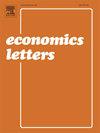The equivalence between random priority and probabilistic serial rule on restricted preference domains
IF 2.1
4区 经济学
Q2 ECONOMICS
引用次数: 0
Abstract
We study the outcome equivalence between the random priority (RP) rule and the probabilistic serial (PS) rule on restricted preference domains. For random assignment problems defined on restricted tier domains, the following three statements are equivalent: The RP rule is outcome equivalent to the PS rule; On each tier consisting of two objects all agents except one have the same preferences over objects in such tier; The RP rule is ordinally efficient. For problems defined on the universal domain, we provide a sufficient condition for the outcome equivalence of the RP rule and the PS rule.
受限偏好域上随机优先权与概率序列规则的等价性
研究了随机优先规则和概率序列规则在受限偏好域上的结果等价性。对于限定层域上的随机分配问题,以下三种表述是等价的:(i) RP规则与PS规则是结果等价的;(ii)在由两个对象组成的每一层上,除一个对象外,所有代理对该层中的对象具有相同的偏好;RP规则通常是有效的。对于定义在泛域上的问题,给出了RP规则和PS规则结果等价的一个充分条件。
本文章由计算机程序翻译,如有差异,请以英文原文为准。
求助全文
约1分钟内获得全文
求助全文
来源期刊

Economics Letters
ECONOMICS-
CiteScore
3.20
自引率
5.00%
发文量
348
审稿时长
30 days
期刊介绍:
Many economists today are concerned by the proliferation of journals and the concomitant labyrinth of research to be conquered in order to reach the specific information they require. To combat this tendency, Economics Letters has been conceived and designed outside the realm of the traditional economics journal. As a Letters Journal, it consists of concise communications (letters) that provide a means of rapid and efficient dissemination of new results, models and methods in all fields of economic research.
 求助内容:
求助内容: 应助结果提醒方式:
应助结果提醒方式:


